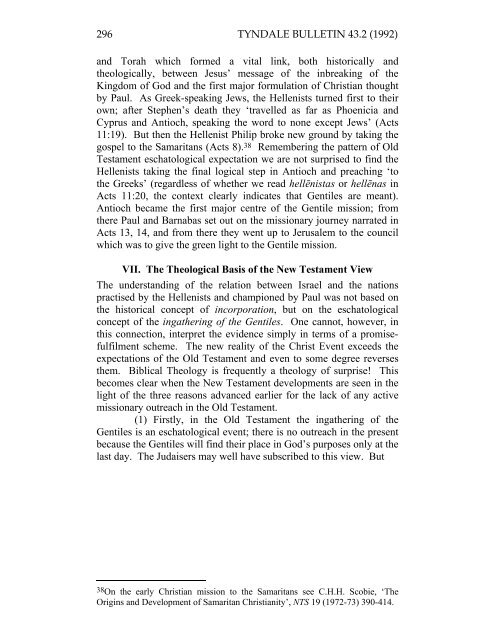israel and the nations: an essay in biblical theology - Tyndale House
israel and the nations: an essay in biblical theology - Tyndale House
israel and the nations: an essay in biblical theology - Tyndale House
You also want an ePaper? Increase the reach of your titles
YUMPU automatically turns print PDFs into web optimized ePapers that Google loves.
296 TYNDALE BULLETIN 43.2 (1992)<br />
<strong><strong>an</strong>d</strong> Torah which formed a vital l<strong>in</strong>k, both historically <strong><strong>an</strong>d</strong><br />
<strong>the</strong>ologically, between Jesus’ message of <strong>the</strong> <strong>in</strong>break<strong>in</strong>g of <strong>the</strong><br />
K<strong>in</strong>gdom of God <strong><strong>an</strong>d</strong> <strong>the</strong> first major formulation of Christi<strong>an</strong> thought<br />
by Paul. As Greek-speak<strong>in</strong>g Jews, <strong>the</strong> Hellenists turned first to <strong>the</strong>ir<br />
own; after Stephen’s death <strong>the</strong>y ‘travelled as far as Phoenicia <strong><strong>an</strong>d</strong><br />
Cyprus <strong><strong>an</strong>d</strong> Antioch, speak<strong>in</strong>g <strong>the</strong> word to none except Jews’ (Acts<br />
11:19). But <strong>the</strong>n <strong>the</strong> Hellenist Philip broke new ground by tak<strong>in</strong>g <strong>the</strong><br />
gospel to <strong>the</strong> Samarit<strong>an</strong>s (Acts 8). 38 Remember<strong>in</strong>g <strong>the</strong> pattern of Old<br />
Testament eschatological expectation we are not surprised to f<strong>in</strong>d <strong>the</strong><br />
Hellenists tak<strong>in</strong>g <strong>the</strong> f<strong>in</strong>al logical step <strong>in</strong> Antioch <strong><strong>an</strong>d</strong> preach<strong>in</strong>g ‘to<br />
<strong>the</strong> Greeks’ (regardless of whe<strong>the</strong>r we read hellēnistas or hellēnas <strong>in</strong><br />
Acts 11:20, <strong>the</strong> context clearly <strong>in</strong>dicates that Gentiles are me<strong>an</strong>t).<br />
Antioch became <strong>the</strong> first major centre of <strong>the</strong> Gentile mission; from<br />
<strong>the</strong>re Paul <strong><strong>an</strong>d</strong> Barnabas set out on <strong>the</strong> missionary journey narrated <strong>in</strong><br />
Acts 13, 14, <strong><strong>an</strong>d</strong> from <strong>the</strong>re <strong>the</strong>y went up to Jerusalem to <strong>the</strong> council<br />
which was to give <strong>the</strong> green light to <strong>the</strong> Gentile mission.<br />
VII. The Theological Basis of <strong>the</strong> New Testament View<br />
The underst<strong><strong>an</strong>d</strong><strong>in</strong>g of <strong>the</strong> relation between Israel <strong><strong>an</strong>d</strong> <strong>the</strong> <strong>nations</strong><br />
practised by <strong>the</strong> Hellenists <strong><strong>an</strong>d</strong> championed by Paul was not based on<br />
<strong>the</strong> historical concept of <strong>in</strong>corporation, but on <strong>the</strong> eschatological<br />
concept of <strong>the</strong> <strong>in</strong>ga<strong>the</strong>r<strong>in</strong>g of <strong>the</strong> Gentiles. One c<strong>an</strong>not, however, <strong>in</strong><br />
this connection, <strong>in</strong>terpret <strong>the</strong> evidence simply <strong>in</strong> terms of a promisefulfilment<br />
scheme. The new reality of <strong>the</strong> Christ Event exceeds <strong>the</strong><br />
expectations of <strong>the</strong> Old Testament <strong><strong>an</strong>d</strong> even to some degree reverses<br />
<strong>the</strong>m. Biblical Theology is frequently a <strong>the</strong>ology of surprise! This<br />
becomes clear when <strong>the</strong> New Testament developments are seen <strong>in</strong> <strong>the</strong><br />
light of <strong>the</strong> three reasons adv<strong>an</strong>ced earlier for <strong>the</strong> lack of <strong>an</strong>y active<br />
missionary outreach <strong>in</strong> <strong>the</strong> Old Testament.<br />
(1) Firstly, <strong>in</strong> <strong>the</strong> Old Testament <strong>the</strong> <strong>in</strong>ga<strong>the</strong>r<strong>in</strong>g of <strong>the</strong><br />
Gentiles is <strong>an</strong> eschatological event; <strong>the</strong>re is no outreach <strong>in</strong> <strong>the</strong> present<br />
because <strong>the</strong> Gentiles will f<strong>in</strong>d <strong>the</strong>ir place <strong>in</strong> God’s purposes only at <strong>the</strong><br />
last day. The Judaisers may well have subscribed to this view. But<br />
38On <strong>the</strong> early Christi<strong>an</strong> mission to <strong>the</strong> Samarit<strong>an</strong>s see C.H.H. Scobie, ‘The<br />
Orig<strong>in</strong>s <strong><strong>an</strong>d</strong> Development of Samarit<strong>an</strong> Christi<strong>an</strong>ity’, NTS 19 (1972-73) 390-414.

















